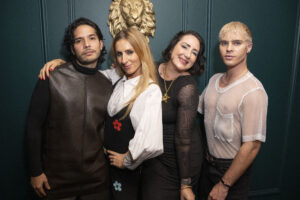Ricardo Sisnett is a lead engineer at Second Dinner Studios Inc. With more than a decade of experience in the gaming industry, he has garnered extensive experience as an engineer specializing in software development and artificial intelligence for video games.
Sisnett was recently honored by Marquis Who’s Who, which inducted him into its prestigious biographical listings for his expertise and accomplishments in his field. After celebrating his trajectory, he looks forward to what’s to come.
Early Inspiration
Born into a family of engineers in Guadalajara, Mexico, Sisnett appeared destined for a career in the field. In 2009, he earned a bachelor’s degree in computer science and technologies from Tecnológico de Monterrey, Mexico, which he later complemented with a master’s degree in computer science, focused on game development and artificial intelligence, in 2017 from the University of Southern California.
While growing up, he also showed an interest in diverse art forms, particularly music and theater. This would later become an anchor to build relationships with colleagues in the games industry and a lens to challenge the established dichotomy between art and technology.
In 2013, he began working for the then-small company Riot Games in Los Angeles. His time at Riot Games was formative and contributed significantly to his knowledge of the gaming industry. He watched Riot Games grow into a major gaming studio with multiple successful games such as League of Legends. He attributes his time at Riot Games as critical to his professional development and insights into the industry.
Minding the Gap
Sisnett has focused much of his work on the gaps that exist between artists and the tools they use, as well as the ones between research and application in artificial intelligence, particularly in games.
As of 2024, Sisnett works at Second Dinner Studios and leads an initiative on a game called Marvel Snap. His work focuses on helping designers, artists, and other game developers bring new content to players as fast as possible. He sees technology as a way to enhance the industry’s talent, and as a technical leader, he’s very interested in building teams that are focused on high performance but also care for one another and enable one another through respect and admiration.
“As technologists, we can only be as great as the people we enable, and as awesome as the things they make,” Sisnett says. “Creators will amaze you. Give them a small tool and they will go build things you could have never imagined.”
Because of this work with people from backgrounds so different from his own, and the lessons that come from being exposed to these ideas, Sisnett is starting a space for these conversations and to foster new ways of interacting with art, technology, and innovative techniques.
The Future of the Conversation
In early 2025, Sisnett revealed revolution solid, an art and technology collective he founded with collaborators from previous projects as a forum to democratize and demystify various technologies, such as artificial intelligence, and to drive forward conversations from multiple angles. The collective recently published “La Imagen Incompleta,” an essay about generative artificial intelligence, its space in the art world, and the impact of this technology throughout the field.
“Much of my research in graduate school was around artificial intelligence and how it applies to creative endeavors and labor, a hot topic these days. I definitely think there’s a lot to be said that I don’t feel a lot of people are discussing,” Sisnett remarks.
As technologies like machine learning and large language models continue to integrate into our daily lives, Sisnett hopes that he can humanize the conversation and bring underrepresented voices into the fold so that the future built is one that enables and enhances our creativity and celebrates the diversity of the human race.








